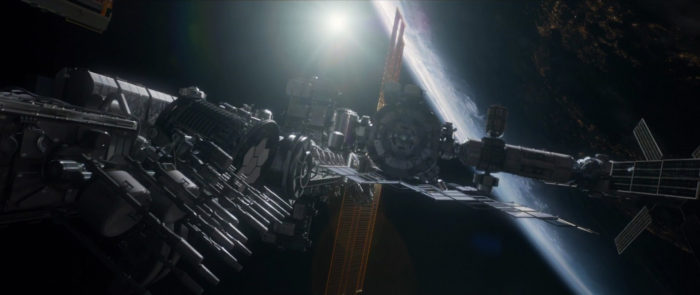One of my favorite genres of film is the sci-fi-horror combo. All the wonder, whimsy of the “what if” of the future set against the agonizing assault on our psyche. The possibility that it might not end up being all that shiny after all. Such is Life.
The studio summary reads as follows:
“A team of scientists aboard the International Space Station discover a rapidly evolving life form, that caused extinction on Mars, and now threatens the crew and all life on Earth.”
Life was directed by Daniel Espinosa who most recently did Child 44 (2015) and was written by Rhett Reese and Paul Wernick who both worked on the smash hit Deadpool (2016) and are currently working on Deadpool 2.
Life opens with a series of amazing space panoramas that make the NASA geek in me smile. We then, quite pointedly, are thrust into the floating space can that is the International Space Station (ISS). The tightness and feeling of enclosure are not an accident here. Humans are only viable in select conditions. No place is more hostile to life than space.

Once in the ISS we are introduced to the crew of six. Seven if you count Pluto the lab mouse. The flight commander is Ekaterina Golovkina (Olga Dihovichnaya) who is Russian and quite serious about her job and seems quite calm while leading her crew of all nations.
Two Americans, David Jordan (Jake Gyllenhaal) and Rory Adams (Ryan Reynolds), and two Brits, Miranda North (Rebecca Ferguson) and Hugh Derry (Ariyon Bakare) are part of the mission. Rounding out the crew is one member from Japan, Sho Murakami (Hiroyuki Sanada). David is a doctor and is looking out for the health of the crew. Rory is the flight engineer and all around fix-it fellow. Miranda is from the CDC and is solely concerned with safety and preventing any form of contamination. Never can be too careful with extraterrestrial organisms, you know, and Hugh is the scientist on board to investigate the new Mars soil samples that the ISS crew is seeking. Sho is the navigator and back up flight engineer.
The first act of the movie consists of much floating aboard the ISS, a la Gravity (2013), and this is truly well done while the team is in the midst of trying to capture the unmanned Mars probe as it cycles back towards Earth with the soil samples that are the focus of the mission. The commander is cool headed. The wise-cracking engineer, Rory (Reynolds), is in fine form. The by the book CDC officer is nagging but adorable. Then success! The probe is caught. The science can now begin.

The second act is all about the discovery of “Calvin,” as he comes to be called, and his growth from a single celled organism to something out of H.R Giger’s nightmares. The amazing realization that life actually and definitively exists is played with great joy and celebration, which only makes the crash into awful that much worse when Calvin turns out to be more than the crew can handle.
Calvin evolves and grows after each kill. It turns into a bigger pseudo-squid with see thru skin. It becomes very dangerous very quickly. Spoiler alert. Turns out Pluto the mouse was the lucky one. Not kidding.
The proverbial “race against time” aspect arrives with the third act. Can the crew save the Earth from a visit from Calvin the Martian or not?

It should be noted that the human interaction with Calvin, Hugh’s mad scientist routine, could quite clearly be the only reason that things turn out the way they do. Had other choices been made who knows? This aspect makes for a particularly haunting outcome.
The overall movie is seriously hurt by the lack of focus and building of real characters but the action, horror and creepiness of Calvin makes for a great ride none the less. Life owes a great deal to Alien (1979), clearly, but it is not a cheap rip off. This film cannot displace Alien by any means. It is more of a comfortable homage to that great film with, believe it or not, an even darker ending.
Life is in theatres now.
